

Measuring the Filter Bubble: How Google is influencing what you click. Over the years, there has been considerable discussion of Google's "filter bubble" problem.
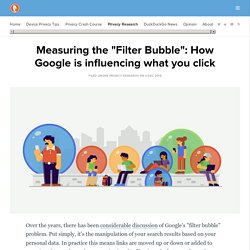
Put simply, it's the manipulation of your search results based on your personal data. In practice this means links are moved up or down or added to your Google search results, necessitating the filtering of other search results altogether. These editorialized results are informed by the personal information Google has on you (like your search, browsing, and purchase history), and puts you in a bubble based on what Google's algorithms think you're most likely to click on. The filter bubble is particularly pernicious when searching for political topics. That's because undecided and inquisitive voters turn to search engines to conduct basic research on candidates and issues in the critical time when they are forming their opinions on them.
Urbinsight – Ecocity Builders. The Urbinsight project is defined by partnerships at multiple levels.
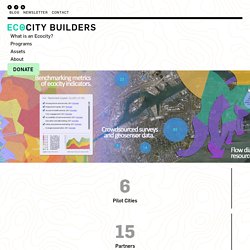
Community: Our primary focus is to identify a Community Based Organization who can lead and inform the community engagement process. Institutional: We look towards working with education institutions and partners to implement curriculum related to participatory research and geographic information systems. Municipal: City level partners are instrumental in providing us with data and information to help guide and frame the ground level analysis which the communities contribute to. Global: Our goal is to create cross city analysis to identify best practices globally that can empower citizens worldwide to create sustainable changes in their or urban context. Thunder-project/thunder.
Future Living - The Helium City. Center for the living city. Bootstrapping Strategy - Doug Engelbart Institute. Doug Engelbart has been most widely celebrated for his pioneering work in information technology, from inventing the computer mouse to producing his now-famous 1968 "Mother of All Demos," showcasing an unprecedented array of breakthrough innovation and marking the dawn of interactive computing and the information age.
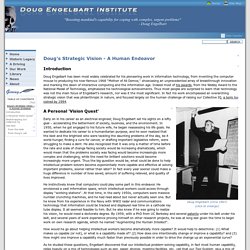
Indeed most of his awards, from the Webby Award to the National Medal of Technology, emphasized his technological achievements. Thus most people are surprised to learn that technology was not the main focus of Engelbart's research, nor was it the most significant. In fact his work encompassed an overarching strategic vision that was philanthropic in nature, and focused largely on the human challenge of raising our Collective IQ, a term he coined by 1994. 1a Early on in his career as an electrical engineer, Doug Engelbart set his sights on a lofty goal – accelerating the betterment of society, business, and the environment.
How to do this? From the Web 4a 4a1. A Blueprint For A Circular Economy: Reusing And Refurbishing For Prosperity. Important question: How can we maintain global prosperity when natural resources are increasingly scarce, the planet is in increasing disrepair, and 3 billion people are expected to join the "middle class" by 2030?
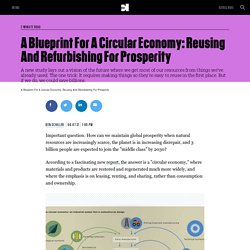
According to a fascinating new report, the answer is a "circular economy," where materials and products are restored and regenerated much more widely, and where the emphasis is on leasing, renting, and sharing, rather than consumption and ownership. "In a circular economy, products are designed for ease of reuse, disassembly and refurbishment, or recycling, with the understanding that it is the reuse of vast amounts of material reclaimed from end-of-life products, rather than the extraction of resources, that is the foundation of economic growth," the study says. In fact, this is no wild-eyed dreaming. The report argues that the current "linear" model of "take-make-dispose" is likely to lead to ever-increasing prices and volatility in the next few years.
Building Online Communities: Keras.io – Free Code Camp. François Chollet is an AI and deep learning researcher at Google.
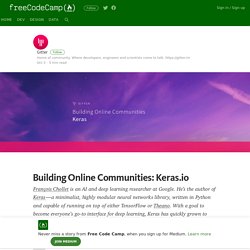
He’s the author of Keras — a minimalist, highly modular neural networks library, written in Python and capable of running on top of either TensorFlow or Theano. With a goal to become everyone’s go-to interface for deep learning, Keras has quickly grown to over 50,000 users. Francois told us about the open source community around the project, and shared his thoughts on the future of deep learning and AI.
If you’re interested in deep learning, be sure to stop by the Keras community channel on Gitter. Hi François! Keras is a deep learning framework for Python. I think Keras has done a great deal to make deep learning easier to get started with, and more accessible, which is a topic I care about a lot. What common goals do you have as a community? But at a higher level, our cause as a community is making artificial intelligence and deep learning more accessible.
A few things I’ve learned: